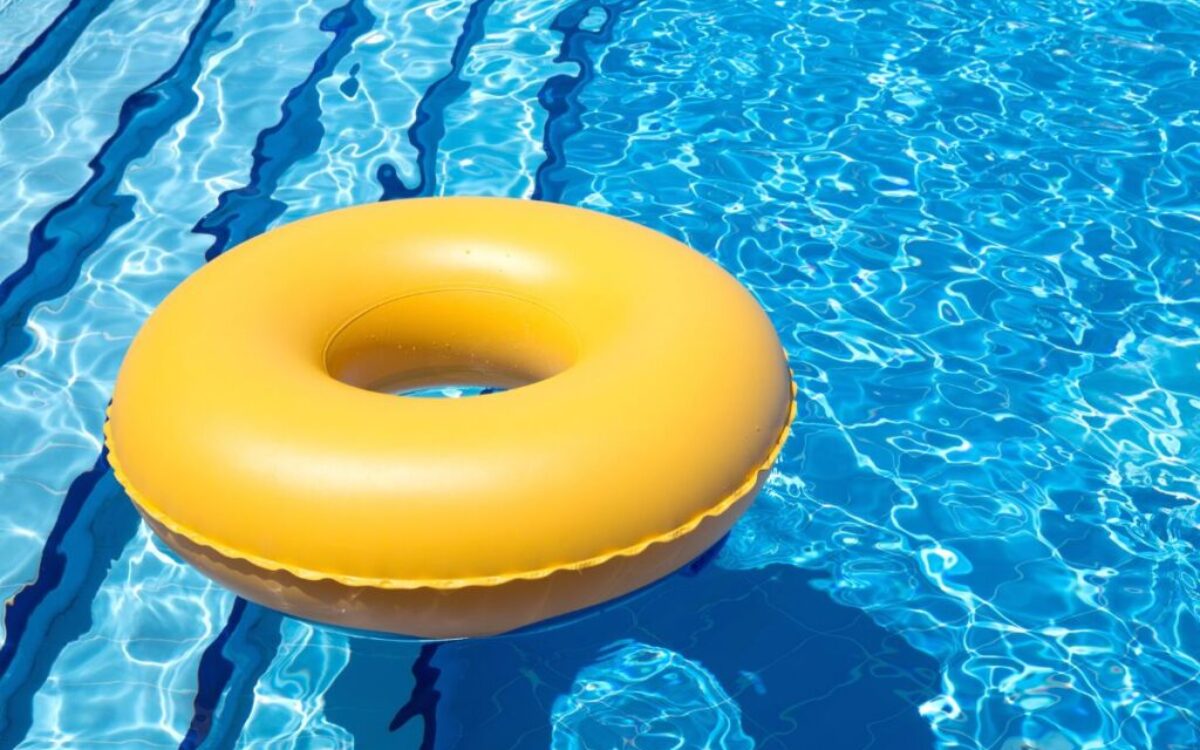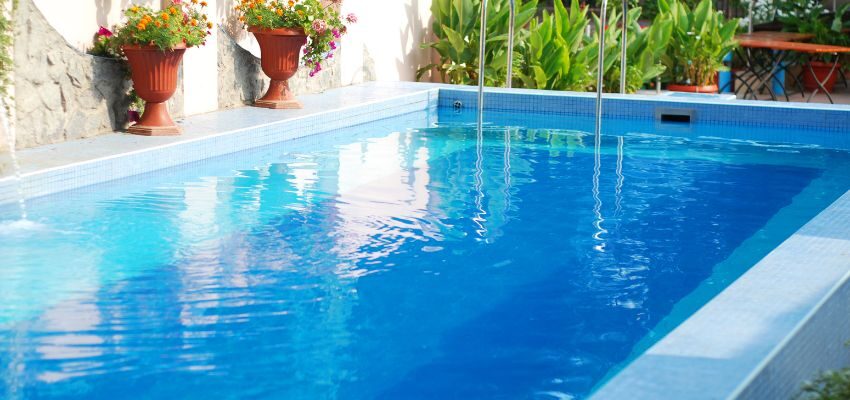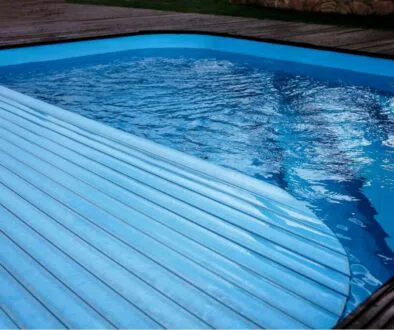Saltwater Pool Vs. Chlorine: What’s The Difference?

Published December 22, 2023
Are all pools the same? It’s time to reconsider. While some may perceive pools as a mere choice between chlorine or saltwater, the truth is much more intricate. Pools are not about water and a spot to beat the heat—they encompass a realm of diversity in materials, functionality, and upkeep.
Among all these options, the overlooked option is the salt water pool. Let’s dive deeper into the comparison between saltwater pool vs. chlorine, stirring up the debate to uncover what truly sets them apart.

What Is A Saltwater Pool?
A salt water pool system utilizes a salt chlorine generator to produce its chlorine. This pool system uses salt, converted into chlorine via the electrolysis process.
Let’s take a closer look at how this process works. Salt is first added to the pool water. The water undergoes electrolysis with the help of the salt chlorine generator. This process splits the salt into water and hypochlorous acid. The acid is responsible for sanitizing the pool. It breaks down harmful substances. Later on, the acid converts back into salt, restarting the cycle.
What Is A Chlorine Pool?
A chlorine pool requires chlorine as the primary method of sanitation. Chlorine, a liquid, granule, or tablet, is added to the water to eliminate bacteria and other harmful substances.
As part of pool maintenance, adding chlorine is a crucial step. Chlorine is manually, whether you use liquid, tablets, or granules. As the chlorine enters the water, it reacts to form hypochlorous acid and hydrochloric acid. This sanitizes the pool by eliminating harmful microorganisms. However, chlorine breaks down over time, reducing effectiveness and requiring more chlorine.
Benefits Of Salt Water Pool
Some may argue that adding salt to a saltwater pool takes the same time and effort as adding chlorine to a chlorine system. However, that’s not its main charm or selling point.
Saltwater pools have advantages over traditional chlorine pools.
Less Maintenance
Salt water pools need less maintenance compared to conventional chlorine-based pools. The salt cell automatically generates chlorine as necessary. This minimizes the need for frequent manual addition of chlorine.
No Chlorine Smell
One of the main issues pool owners often face when adding chlorine is the strong smell of the product. Though the scent eventually fades, its pungent odor is still undesirable.
The chlorine that a saltwater pool produces doesn’t have this smell, though. That’s because the mass-produced chlorine people buy contains many chemicals. This results in a pungent odor. Salt water pools offer a delightful swimming experience. They’re a preferred choice for those seeking an enjoyable dip in the water.

Less Harsh Effects
Another issue on commercial chlorine products is that they’re often quite harsh. Exposure can be so intense that there’s a decent chance your swimsuit or clothes will get bleached while swimming.
If you have recently dyed your hair, it’s also possible the pool water will bleach the dye. Salt-based chlorine doesn’t contain many chemicals. Because of this, it makes sense that it doesn’t have this problem. Though it’s still a bit harsh, it’s not so severe that bleaching is possible.
Cost-Effective In The Long Run
Salt is much cheaper than chlorine. It is, after all, a raw material, while chlorine is a manufactured product. For that reason, the cost of using saltwater pools is often significantly lower than traditional chlorine pools.
These are the main benefits of saltwater pools. But of course, we won’t end this saltwater pool vs. chlorine comparison without talking about the benefits of chlorine pools.
Benefits Of Chlorine Pool
The prevalence of traditional chlorine pools isn’t without reason. There are several reasons why the standard filter system is more popular than saltwater filter systems.
More Affordable Upfront
The only design difference between a chlorine pool and a saltwater pool is that the latter has an extra apparatus installed. It’s the salt chlorine generator. It makes sense that saltwater pools are more expensive up front. This is because they feature extra equipment.
A salt chlorine generator costs around $2,000, depending on location and supplier. If installation is included, expect to pay about $2,500 more for a saltwater pool. Overall, a chlorine pool is viable if you’re tight on budget.

Effective Sanitizer
The added chemicals in store-bought chlorine can harm clothes and hair. However, they effectively get rid of germs plaguing your pool. In other words, store-bought chlorine is more effective than a salt chlorine generator. It works best in eliminating bacteria, viruses, and algae.
Fast-Acting And Visible Results
Once chlorine is added to the pool, its cleansing properties immediately activate. This makes it beneficial for frequently used pools.
Ease Of Use
Adding chlorine tablets or liquid to your pool is straightforward, making it a user-friendly system. It’s an effortless way to keep your pool clean and clear.
What Are The Disadvantages Of Saltwater And Chlorine Pools?
While saltwater and chlorine pools have several benefits, they also have their drawbacks you need to know. Let’s take a closer look at these cons:
Saltwater Pools
- Initial cost. Saltwater systems may incur higher upfront costs compared to conventional chlorine systems. Nevertheless, the long-term advantages they offer render them a valuable investment.
- Maintenance of salt chlorine generator. The daily maintenance may be minimal. However, the salt chlorine generator may require substantial upkeep or eventual replacement.
- Complexity. Some homeowners may find it challenging to understand and operate the system. This is especially true when trying to achieve a delicate balance in water chemistry.
Chlorine Pools
- Regular maintenance. It’s crucial to maintain safety. Routinely monitor levels and add chlorine frequently. For some, the process can be time-consuming and requires a consistent commitment.
- Chemical storage. The storage can pose a safety hazard, requiring homeowners to take proper precautions. Chlorine must be stored in a cool, shaded area with adequate ventilation.
- Skin and eye irritation. High levels can trigger skin and eye irritation. Some individuals may show sensitivity to the distinct odor of chlorine.
- Cost over time. The initial setup may seem more affordable. However, the long-term expenses of maintenance can accumulate over time.
Every homeowner has different priorities and needs. Keep this in mind. It’s essential to weigh the benefits and dangers of salt water pools and chlorine pools before deciding on the right system for your home.

Which Is The Better Choice: Chlorine Vs Salt Water Pool?
In general, chlorine and saltwater pools have advantages and disadvantages. Ultimately, the choice between the two types of pools will depend on your judgment. If you want professional insights, consider partnering with reputable Boca Raton pool services.
However, to make an informed decision, here are some valuable insights from the comparison of saltwater pool vs. chlorine:
A chlorine pool is a favorable option if:
- You have budget constraints
- The cost at your local store is affordable
- You’re not bothered by the odor and potential harsh effects of store-bought variant
A saltwater pool is preferable if:
- You have the means to invest
- The cost of chlorine in your local store is exorbitant
- Your skin and sense of smell are more sensitive than the average person’s
Keep these guidelines in mind. Then, you can select the ideal option for your specific situation.

Frequently Asked Questions About Saltwater And Chlorine Pools
1. Are salt water pools healthier for you?
Swimming in a chlorine pool can cause your skin to become dry and itchy. Alternatively, a salt water pool may be better for your skin. Soaking in one can leave your skin softer and smoother.
2. What is the healthiest pool water?
Ozone is capable of eliminating bacteria at a faster pace than chlorine. Doing so makes it the most effective sanitation system. Treating a pool with chlorine alone will take around 16 minutes to eliminate viruses.
3. Do salt water pools have bacteria?
A saltwater pool still produces chlorine via saltwater generators. The saltwater will sanitize your pool. It executes this process via electrolysis, which generates bacteria-killing chlorine.
4. Is it detrimental to swim in chlorine every day?
Chlorine can irritate the eyes, hair, and teeth. Those who go on occasional swimming might not have significant side effects. However, those who swim regularly are more likely to experience the side effects of exposure.
Dive Into The Depths: Saltwater Pool Vs. Chlorine Showdown Unveiled
Understanding the difference between saltwater pool vs. chlorine will help you make the right choice. Remember, it’s not just about a place to swim but the experience and upkeep. The choice is yours to make. Whether you focus on cost-effectiveness, gentler skin care, or superior sanitization. Explore what fits your lifestyle before plunging into your ideal pool paradise.
Hire Boca’s Favorite Pool Builders
Excel Pool and Patio Solutions is your trustworthy provider of pool services in Boca Raton. We are experts in pool and patio remodeling and can handle your resurfacing needs as well. Our technicians are vetted and trained for your guaranteed satisfaction. Get to know us by browsing our website or reaching out to us with any questions.
Contact our team today to request a free estimate for pool construction, maintenance, repairs and more.

Fact Checked By Experts
This is original content and has been diligently fact checked by our internal team of experts. Discover more about the rigorous editorial standards we uphold for our website here.

About The Author
Lenard Arceo is an experienced writer and digital marketing expert. He loves to code and spending time outdoors. He has helped many reputable websites grow over the years.



